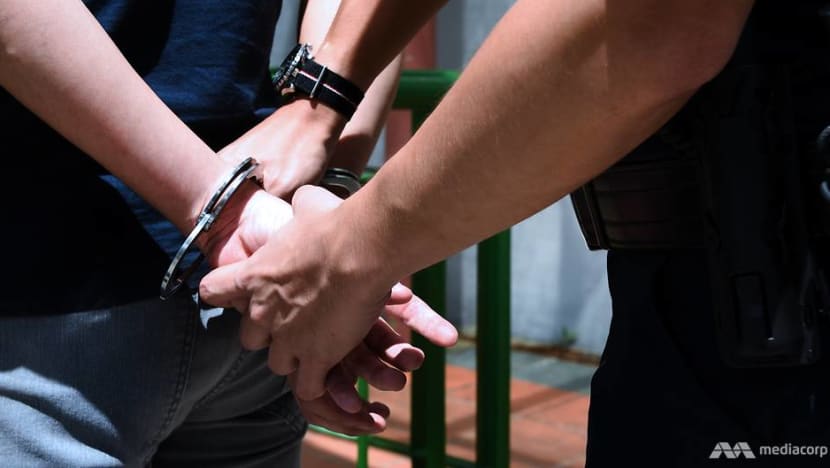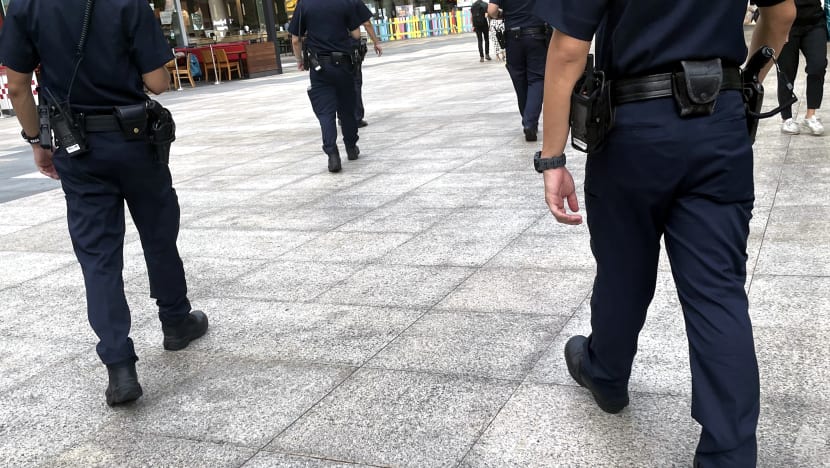Singapore police to have more powers to conduct searches without warrants under proposed changes to law
Several proposals were put forth by the Law and Home Affairs ministries to amend the key legislation governing Singapore’s criminal justice process.

A police officer arrests a suspect. (File photo: CNA/Hanidah Amin)

This audio is generated by an AI tool.
- The Bill proposes that police officers be given powers to search suspects at the point of arrest in order to remove dangerous items such as razor blades and needles
- If the proposed amendments are passed in parliament, it would be an offence for a suspect to refuse a forensic medical examination required by the police without a reasonable excuse
- Another proposal is for prison officers to have the power to pursue and arrest an offender who has absconded from community-based programmes or failed to return to prison after being recalled
SINGAPORE: A new Bill was introduced in parliament on Wednesday (Jan 10) to allow police officers to search suspects without a warrant in more situations, as well as search suspects during arrest to remove dangerous items.
These are part of several significant proposals by the Law and Home Affairs ministries to amend the key legislation governing Singapore’s criminal justice process.
The amendments are aimed at protecting the public by strengthening the authorities’ powers to tackle crime, including serious sexual crime, and enhancing the country’s criminal court processes, the ministries said.
If the Criminal Procedure (Miscellaneous Amendments) Bill is passed in parliament, the police will also be empowered to require accused people to undergo a forensic medical examination if it is relevant, such as taking DNA swabs or blood samples.
It will be an offence for those who refuse to do so without reasonable excuse, and the Bill sets out the proposed penalties.
The two ministries also proposed a new and harsher sentencing option for dangerous offenders who commit violent or sex crimes, including minimum jail terms and detention beyond jail for up to life.
POWERS OF SEARCH AND INVESTIGATION
The Bill seeks to “update and enhance” the powers of the police and other law enforcement agencies, including their powers of arrest, search and investigation, the ministries said in a media release.
This will better equip them to combat crime and lead to greater operational efficiency, they added.
For instance, the police will be empowered to conduct a search without a warrant when they have reason to believe that a suspect implicated in an arrestable offence possesses or has power over evidence.
Currently, police officers can only conduct a search without a warrant if they believe a person will not, or is unlikely to, produce the evidence in the face of a production order.
Uncooperative suspects can hamper investigations by delaying searches and tampering with evidence, the ministries said.
During a media briefing on Monday, Law and Home Affairs Minister K Shanmugam told reporters that it is not easy for police officers on the ground to determine whether a suspect will comply.
Mr Shanmugam said: “There is no downside to this amendment because if they search and they find the evidence, or if they do not find the evidence, no one is worse off.
"And, if challenged, the police will show you why they reasonably suspected the person to have the evidence. This would make things easier for the police and law enforcement agencies on a day-to-day basis.”
Under the Bill, obstructing a police officer from conducting a lawful search will be an arrestable offence as well. Those convicted could be jailed for up to six months or fined up to S$5,000 (US$3,750), or both.
A body corporate, limited liability partnership, partnership or an unincorporated association that is convicted of the offence could be fined up to S$10,000.

The Bill also proposes to give the police powers to search suspects at the point of arrest in order to remove dangerous items such as razor blades and needles.
Separately, the powers of other law enforcement agencies – including the Central Narcotics Bureau as well as the Immigration and Checkpoints Authority – will be expanded to deal with matters arising from offences under their purview.
For example, the agencies will be able to re-arrest those who have escaped from their custody. They will also be able to investigate offences involving bail and absconding.
Prison officers will have the power to pursue and arrest an offender who has absconded from community-based programmes or failed to return to prison after being recalled.
This allows the agency that is most familiar with details of a particular case to conduct the necessary arrests or investigations, the ministries said.
FORENSIC MEDICAL EXAMINATIONS
Among the ministries’ other proposals is a legislative framework to provide clarity on forensic medical examinations and allow for more effective criminal investigations.
Forensic medical exams are conducted to obtain forensic evidence critical for investigations – especially for serious sexual offences like rape.
These exams come in the form of physical medical exams, collection of body samples from any body part, as well as taking of photographs, casts and impressions of body parts, which may include intimate parts.
For example, in 2002, swabs were taken from a 12-year-old girl’s intimate areas and at the crime scene where she was raped near her home.
The case was finally solved in 2014 when the accused was arrested for theft. A blood sample was taken from him and his DNA profile was a match to the cold case.
The suggested framework will give police officers the power to require accused people to undergo a forensic medical exam where it is relevant to the investigation of an offence that is reasonably suspected to have been committed.
If the Bill is passed, it will be an offence to refuse to undergo such an exam without reasonable excuse. This is to ensure that accused people comply with investigations, said the Law and Home Affairs ministries.
The proposed punishment is up to seven years’ jail or a fine or both – the same penalty for obstruction of justice under the Penal Code. The courts may also draw negative inferences in such cases if they go to trial.
The ministries said “reasonably necessary” force may be used for forensic medical exams that do not involve intimate parts or invasive procedures, such as buccal swabs or hair samples.
Force cannot be used for procedures involving intimate parts and invasive procedures.
There are no substitutes for certain types of forensic medical exams, the ministries said. These include penile swabs taken from those accused of sexual crimes to show proof of contact.
Forensic medical exams also have to be done quickly as some types of evidence may be lost, degraded or contaminated.
As for forensic medical exams carried out on victims, informed consent will generally be required from them or their authorised decision-maker – depending on the victim’s age.
Some exceptions apply, such as if a victim is in a comatose state.
An exception will be made only if a delay leads to evidence being lost, degraded or contaminated. When a victim’s condition is temporary, the police will "try as far as possible" to wait for them to recover and seek their consent for a forensic medical exam, said the ministries.
Safeguards will be put in place to ensure forensic medical exams are conducted appropriately, and that those undergoing the exams are treated sensitively.
For example, only medical professionals can conduct physical exams and invasive procedures like blood drawing.
Only police officers holding the rank of inspector or above can order a forensic medical exam involving intimate parts to be conducted. Only female officers or specialists will be allowed to photograph and perform swabs on a female subject’s intimate parts.
PERSONAL BOND, CRIMINAL DISCLOSURE
Separately, the courts will be given powers under the Bill to allow those accused of relatively minor charges to be released on personal bond, rather than bail.
This means that more accused persons can be released before trial. At the moment, they have to be remanded if they are offered bail but cannot find a bailor.
The Bill also seeks to fine-tune some aspects of the statutory pre-trial disclosure regime, also known as the criminal case disclosure regime where the prosecution and defence exchange information about their cases before trial.
The regime is set out in the Criminal Procedure Code and established under case law.
To make these disclosure obligations clearer and more coherent, the Law and Home Affairs are proposing to place them on a statutory footing by codifying, clarifying or modifying aspects of these obligations.
The ministries are also proposing to make it mandatory for accused persons to participate in the criminal case disclosure regime in both State Court and High Court cases.
Prosecutors handling High Court cases will also be required to disclose more information on their cases, mirroring how it is done in the lower courts.
The Bill will be debated in parliament at a later sitting.


















